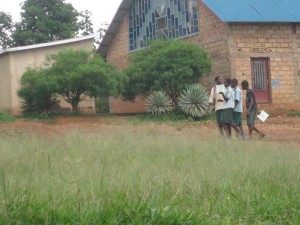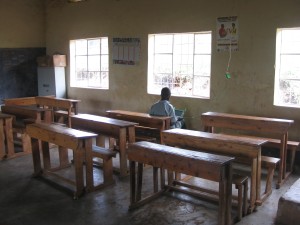Day 1 & 2 of Malaria Camp
On Monday, 75 children from p5 (grade 5) and 7 teachers arrived at Nonko. The day started off stressful because, since the laptops do not go home with the children, and are not given out during school this term, when the 75 laptops and chargers were given to the students many of them had problems. The biggest problem was that laptops had not been upgraded to the newest software. This upgrade process was a responsibility of the Rwandan core team but because of size, management, etc. it was not done. There were also 20 laptops that were broken, a majority were screen and motherboard malfunctions. There were also a large number of broken chargers, around 35 of 100. This wasn’t surprising as the chargers were all tangled and haphazardly thrown into the box, it took some time to unravel all the knots in the cords. This made me more excited to start the technical team at Nonko, made up of teachers, so that the school can know how to properly handle the equipment. And obviously, these problems wouldn’t exist if each child owned their own laptop, because when it is theirs, they take care of it.
Regardless of the rough start, it was great to see the children excited to, once again, have laptops. They immediately opened Scratch and Record and started working together showing each other what they remembered to do. We separated the kids into the advanced & beginning groups. It had been a while since using their laptops, so we wanted the kids to have time to just play, unfortunately, the power went down, so this gave us a time to talk. After introductions, myself and a KIE intern (who was translating) asked where do the kids think we worked? The yelled “MINEDUC” and “KIST”….. and we explained to them what OLPC was. None in the class knew the name before! I am not sure how it came up but all of the kids said that it was Bill Gates who gave them the laptops! (Of course we corrected them.) Then we asked “why are the laptops here?” The responses were” “to help us study;” “to help us learn English;” “to help us learn ICT…” This led into a brief discussion about learn by doing. We asked the children who knows how to ride a bike? Almost the whole class raised their hands. “Okay, and how did you learn to ride the bike?” The students used their hands to show me they were grabbing invisible handlebars and moving their feet, and then one student said, “we learned to ride the bike by riding it!” Exactly! We explained to them that this was the same idea with the laptops, the children can create and figure out things on their own, and this is one of the most powerful ways to learn.
We ended the day with the students brainstorming their curiosities about malaria. This led to two interesting debates: one student asked “how many people die each year in Rwanda from malaria?” One student responded “7 people” another said “100%.” It was interesting to think how they arrived at these guesses and if they understand the relation of these numbers to the entire population.
I have heard from my colleagues that there are many myths surrounding malaria in Rwanda, such as, if you eat many mangos, you will get malaria, if you work in the sugarcane field you will get malaria, etc. I asked the students if they heard these myths and if they were true. After my question was translated, half of the kids started to yell “yego!!! (yes)” and the other half “ohya!!! (no).” I told them it would be interesting if they wanted to investigate these myths further and see how they can be proven or disproven.
For the second day, the advanced group had one student act out how he felt, looked, sounded when he had malaria. And they use Scratch to program some with the same symptoms. Soon all of the students true a person holding their stomach, bended over, throwing up and moaning in pain!
In the beginner rooms we started off with basic laptop introduction. Each student created a project introducing themselves to their peers. We told them to try and make their introductions really interesting, not just name, grade, age, etc. One KIE trainer invited me to see his class share their introductions. The first student said that he has an African mother and an American father and his father’s name is Barack Obama and he is the President of the United States. His father has asked him to come visit him in USA and live in the White House. (So creative!) The next student wrote about her dreams, one of which was to cultivate the land–even though her parents did not like cultivating.
The teachers were much more slow to start. 7 out of 12 teachers attended, and were very late. The first day, teachers told the trainers, please just “show us how to use the laptop in a lesson! We just need an example of how we can teach!” So our colleague, Jimmy, shifted the training slightly to focus on acquiring basic skills, this made the teachers more confident. While things always go great with kids, we need to realize that working with teachers will take much more time and a much bigger cultural shift. We recently heard that teachers are paid just $40/month (less than some gardeners). They also work with many children in a language they are not comfortable with–English. This is why it is so important to make sure kids are using the laptops, even before teachers feel comfortable to use, because the latter will take much more time, but it is a process and we will get there!
Some pictures from the first 2 days:







Wawouh!
*The learnes are motivate( in pictures) *the learnes are creative ( their project like obama’s )
those are the proof show that the goals of true education will be achieved. But the number of teachers is still a problem. So thanks to all trainers
Eh,Julia I wish you were there at Nonko today,I am grateful to the work we have done so far,it was amazing and encouraging…. What about you in Rwamagana? Miss you guys,conglats